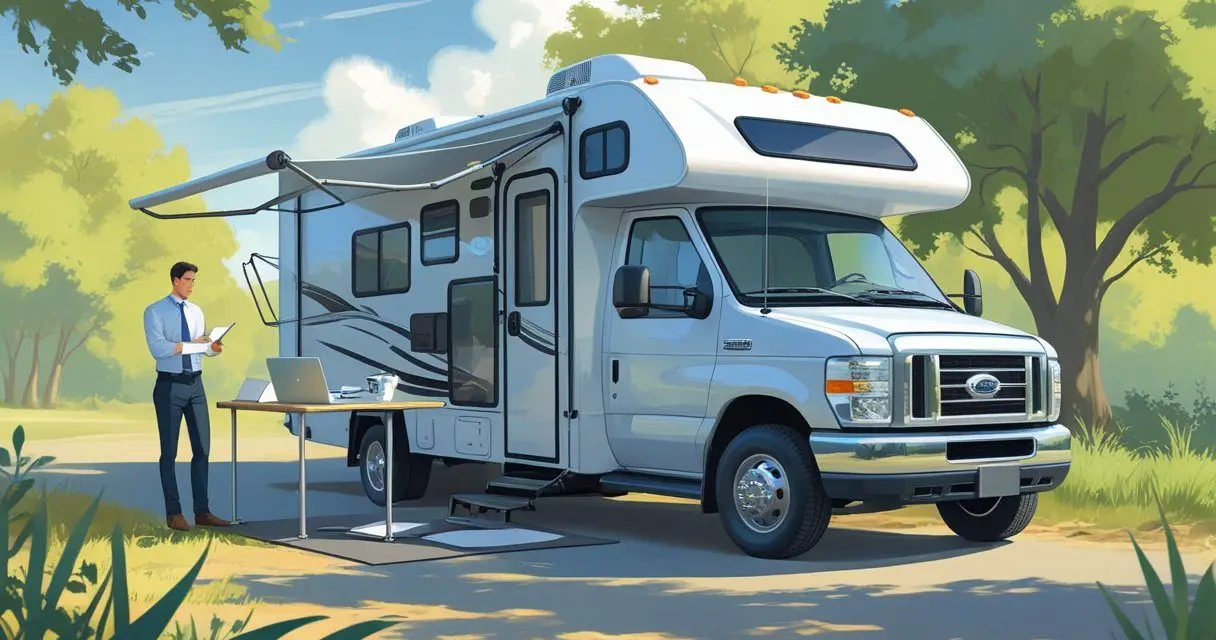Using an RV for business can open the door to unique tax benefits, but the rules are specific. You can write off an RV as a business expense if it is used primarily for business purposes and you keep clear records of that use.
This means the RV must function as more than just transportation—it needs to directly support your work, such as serving as a mobile office, meeting space, or travel vehicle for business operations.
You may be able to deduct costs like fuel, insurance, maintenance, and even depreciation, but only in proportion to how much the RV is used for business. The IRS requires detailed documentation, so tracking mileage, expenses, and business activities is essential.
Before you decide, it’s important to understand how depreciation rules, percentage of business use, and proper reporting affect your deductions. Knowing these details helps you avoid mistakes while making the most of legitimate tax opportunities.
Key Takeaways
- You can deduct RV costs if it is used mainly for business.
- Expenses and depreciation depend on accurate tracking and reporting.
- Professional guidance helps maximize benefits and avoid errors.
Can I Write Off an RV as a Business Expense?
You may be able to treat an RV as a business asset and take tax deductions, but the IRS has strict requirements. The amount you can deduct depends on how much the RV is used for business, how you document expenses, and whether you follow the reporting rules correctly.
IRS Rules for Business Use
The IRS allows an RV to qualify for business deductions only if it is used more than 50% of the time for business purposes. This means the RV must serve a direct role in your work, such as a mobile office, meeting space, or part of daily operations.
If you meet this threshold, you can deduct a share of operating costs like fuel, insurance, maintenance, and campground fees. You may also depreciate the RV under the Modified Accelerated Cost Recovery System (MACRS), usually over five years.
You can choose between Section 179 expensing or bonus depreciation if you want to deduct a larger portion of the RV’s cost in the first year. Section 179 has limits based on purchase price, while bonus depreciation phases down over time.
Business Versus Personal Use
The IRS requires you to separate personal use from business use. You can only deduct the percentage of expenses tied directly to business activities.
For example, if 70% of your RV mileage is business-related, you can deduct 70% of fuel, insurance, and repair costs. Personal trips, vacations, or family outings do not qualify.
Mixing personal and business use without proper tracking can lead to denied deductions or penalties. A simple way to calculate your deduction is:
| Expense Type | Deductible Portion (if 70% business use) |
|---|---|
| Fuel | 70% |
| Insurance | 70% |
| Repairs/Maintenance | 70% |
| Campground Fees | 70% |
Would you like to save this article?
This proportional method ensures you only claim what is allowed.
Documentation and Recordkeeping
Accurate records are critical when claiming RV tax deductions. The IRS expects a detailed log of business activities, including dates, destinations, mileage, and purpose of each trip.
You should also keep receipts for fuel, repairs, insurance, and parking fees. Digital tools or apps can help track mileage and store receipts in one place.
If you claim a home office deduction inside the RV, you must designate a specific area used exclusively and regularly for business. Floor plans, photos, or written notes can support this claim.
Good documentation not only protects you in case of an audit but also ensures you maximize legitimate write-offs without crossing IRS rules.
Qualifying Your RV for Business Deductions
To claim tax benefits for your RV, you must show that it serves a clear business purpose and meets IRS requirements. The rules vary depending on how you use the RV, whether as part of a sole proprietorship, a mobile office, or a rental business.
Sole Proprietor and Small Business Use
If you operate as a sole proprietor or run a small business, you may treat your RV as a business asset. To qualify, the RV must be used for business more than 50% of the time.
Occasional personal use is allowed, but you must keep accurate records to prove the majority of use is business-related. Deductible expenses can include loan interest, insurance, fuel, maintenance, and depreciation.
You may also qualify for a Section 179 deduction, which allows you to deduct a large portion of the RV’s cost in the year it is placed in service. Proper documentation is key.
You should keep a mileage log, receipts, and a calendar showing business trips. Without this, the IRS may disallow your deductions.
Mobile Office and Work Purposes
Using your RV as a mobile office can also qualify for business deductions. This applies if you travel for client meetings, trade shows, or project sites and use the RV as your primary workspace.
To meet IRS standards, the RV must have the features of a residence: sleeping, cooking, and bathroom facilities. This ensures it qualifies as a business vehicle rather than just a personal travel trailer.
Expenses you may deduct include:
- Operating costs – fuel, repairs, campground fees
- Depreciation or Section 179 – depending on weight and business percentage
- Utilities and internet – if used for business purposes
Keep detailed records of business mileage, nights used for work, and the purpose of each trip. Claims of 100% business use are often flagged for audit, so be realistic and accurate.
Rental and Investment RVs
If you purchase an RV to rent out, you may treat it as part of an RV business. In this case, the RV is considered an income-producing asset.
You can deduct expenses such as advertising, repairs, insurance, property taxes, and depreciation. However, you cannot use both Section 179 and Schedule E rental depreciation.
You must choose one method. Section 179 works better if you want a larger upfront deduction, while regular depreciation spreads the benefit across several years.
You should also keep contracts, rental agreements, and expense records to support your deductions. If you personally use the RV, you must separate personal days from rental days to calculate the correct deductible percentage.
Depreciation and the Modified Accelerated Cost Recovery System (MACRS)
When you use an RV for business, you may recover part of its cost through depreciation. The IRS requires most business vehicles, including RVs, to follow the Modified Accelerated Cost Recovery System (MACRS), which allows you to spread deductions over several years with larger write-offs in the earlier years.
How Depreciation Works for RVs
Depreciation lets you deduct the cost of your RV over time instead of all at once. To qualify, the RV must be used for business more than 50% of the time.
Personal use reduces the deductible portion. The IRS assigns recovery periods to different assets.
RVs typically fall under the 5-year property class when used for business travel or as mobile office space. That means you spread the cost over five tax years, though the deduction amounts vary by year.
Depreciation starts when you place the RV in service, not when you buy it. If you stop using it for business, you must stop depreciating it.
If you sell it, you may also need to recapture some of the depreciation as taxable income. Keeping accurate mileage logs, receipts, and business use records is essential.
Without proof, the IRS may disallow your write-offs.
MACRS Explained
MACRS is the standard system for depreciating most business property placed in service after 1986. It offers accelerated depreciation, meaning you deduct more in the first few years and less later.
Under MACRS, you usually choose between:
- 200% declining balance method (commonly used for vehicles, including RVs).
- 150% declining balance method (slower than 200%, but still accelerated).
- Straight-line method (equal deductions each year).
MACRS also uses conventions to determine when depreciation starts:
- Half-year convention – treats property as placed in service midyear.
- Mid-quarter convention – applies if you place more than 40% of property in service in the last quarter.
- Mid-month convention – used mostly for real estate, not RVs.
Choosing the right method and convention affects how quickly you recover costs and how much you can write off in the early years.
Bonus Depreciation Opportunities
Bonus depreciation allows you to deduct a large portion of the RV’s cost in the first year it’s placed in service. In recent years, the IRS permitted up to 100% bonus depreciation for qualifying property, though the percentage is scheduled to phase down in future years.
To qualify, the RV must be used primarily for business and must be new to you, even if it’s a used RV. You can combine bonus depreciation with MACRS, taking a large upfront deduction and then depreciating the remaining balance over the recovery period.
Bonus depreciation is optional. You may elect out if spreading deductions over several years better matches your income.
This choice can help you avoid large write-offs in low-income years when deductions provide less tax benefit. If you later reduce business use below 50%, you may need to recapture part of the bonus depreciation.
Careful planning helps you avoid unexpected tax liabilities.
Common Deductible Expenses for RV Businesses
When you use an RV for business, certain costs can qualify as deductible expenses. These write-offs often include upkeep, required coverage, and travel-related spending that directly supports your work.
Careful record-keeping is key to making sure these deductions hold up if reviewed.
Maintenance and Repairs
You can deduct the cost of keeping your RV in safe and working condition when it is used for business. This includes routine maintenance such as oil changes, tire rotations, and brake checks.
It also covers repairs like fixing a generator, replacing worn tires, or repairing plumbing and electrical systems. These expenses are considered necessary to keep your business asset operational.
If you use your RV for both business and personal reasons, you must allocate the costs based on business use percentage. For example, if 70% of your mileage is business-related, then 70% of the repair bill is deductible.
Keep receipts, invoices, and service records to back up your claim. Without documentation, the IRS may deny the deduction.
Using a mileage log alongside maintenance records helps establish a clear connection between the expense and your business use.
Insurance and Registration
RV insurance is a deductible expense when tied to business activities. This includes liability, collision, and comprehensive coverage.
If you use the RV as a mobile office, store, or rental unit, business-specific insurance policies may apply, and those premiums are also deductible. Registration fees and annual licensing costs can also qualify as business write-offs.
Like with maintenance, you must divide the expense if the RV serves both personal and business purposes. For instance, if you pay $1,200 in insurance premiums and your RV is used 60% for business, you can deduct $720.
It is important to keep policy documents and proof of payment. These records show that the expense was required for legal operation and business protection, which strengthens your tax deduction claim.
Travel and Lodging Costs
When you travel for business in your RV, certain costs may be deductible. This includes fuel, campground fees, tolls, and parking.
If you stay overnight for work purposes, lodging costs tied to RV parks or hookups can also be written off. Meals during business travel may qualify for a partial deduction, but you must follow IRS rules on meal expenses.
Personal sightseeing or vacation days during the trip are not deductible, so you need to separate those costs from business-related ones. A clear travel log with dates, destinations, and business purposes is essential.
This log should match receipts for gas, lodging, and other expenses. Accurate records ensure your RV travel deductions are valid and defensible if questioned.
Special Considerations for Full-Time RVers
When you live in your RV full-time, the IRS views your situation differently than someone who only travels part-time. The way you define your tax home, claim a home office, and separate personal travel from business use will affect what deductions you can take.
Tax Home and Domicile Issues
For tax purposes, the IRS expects you to have a tax home, which is usually the location of your main business or employment. As a full-time RVer, you may not have a fixed address, which makes this more complicated.
If you do not maintain a permanent residence outside of your RV, you generally cannot deduct lodging expenses. The IRS considers your RV your primary home, so campground fees or monthly site rentals do not qualify as business lodging.
You should keep records that show where you earn income and how your travel supports that work. Some full-time RVers choose a domicile state such as Texas, South Dakota, or Florida because of favorable tax laws.
Establishing this domicile can help clarify your legal and tax situation, but it does not automatically create deductible travel expenses.
Home Office Deduction Differences
If you use part of your RV strictly for business, you may qualify for a home office deduction. The rules require that the space be used regularly and exclusively for work.
For example, a desk area where you run your business could qualify, but a dining table used for both meals and work would not. The deduction can be calculated in two ways:
- Simplified method: A flat rate per square foot of office space.
- Actual expense method: A percentage of RV-related costs such as utilities, insurance, and depreciation.
Because an RV is small, proving exclusive use can be harder than in a traditional house. You should take photos, keep logs, and document how the space is used to avoid disputes with the IRS.
Personal Versus Business Travel
One of the biggest challenges for full-time RVers is separating personal travel from business travel. If you are driving to a client meeting or a worksite, mileage and related costs can be deductible.
If you are moving to a new campground for leisure, those expenses are personal and not deductible. The IRS requires clear documentation.
A mileage log, travel diary, and receipts are essential. You should note the business purpose of each trip, the distance traveled, and the dates.
If your RV serves both personal and business purposes, you may only deduct the percentage of expenses tied to business use. For example, if half of your travel is for work and half for personal reasons, you can only deduct 50% of fuel, maintenance, and depreciation.
Best Practices and Professional Guidance
Using an RV for business can create valuable tax benefits, but the process requires careful planning. You need the right advisor, accurate records, and a clear understanding of what expenses qualify as deductible.
Choosing the Right Tax Advisor
A tax advisor with experience in small business deductions and vehicle depreciation rules can help you avoid costly errors. Not every accountant is familiar with how RV tax deductions work, so you should ask about their background with mobile offices, Section 179, and bonus depreciation.
Look for professionals who understand both business use requirements and personal use limits. If your RV doubles as a personal vehicle, the advisor should guide you on how to separate business mileage and expenses.
When interviewing advisors, ask direct questions:
- Have you filed returns with RV-related deductions?
- How do you recommend documenting mixed-use vehicles?
- What strategies do you use for maximizing depreciation?
Avoiding Common Mistakes
Many owners make errors by trying to deduct costs that don’t qualify. For example, you cannot deduct the full loan payment on the RV.
Instead, you can only claim interest, depreciation, and a portion of operating costs tied to business use. Another mistake is failing to meet the 50% business-use test.
If you use the RV for personal trips more than half the time, the IRS will not allow most business deductions. Keeping a log that proves majority business use is essential.
Misclassifying upgrades is also a problem. Routine maintenance, like oil changes or tire replacements, is deductible.
Major improvements that increase the RV’s value, such as a solar system or new engine, generally must be depreciated over time. Avoid these mistakes by reviewing IRS guidance and confirming gray areas with a qualified tax professional.
Recordkeeping Tips
Strong records support your deductions if the IRS audits your return. You should keep a mileage log that tracks:
- Date of each trip
- Starting and ending mileage
- Destination
- Business purpose
Save receipts and invoices for fuel, insurance, repairs, campground fees, and tolls. Storing them digitally can make retrieval easier.
For depreciation claims, keep purchase documents, loan agreements, and any records of improvements.
If you claim a home office deduction inside the RV, create a simple floor plan showing the square footage used only for work.







